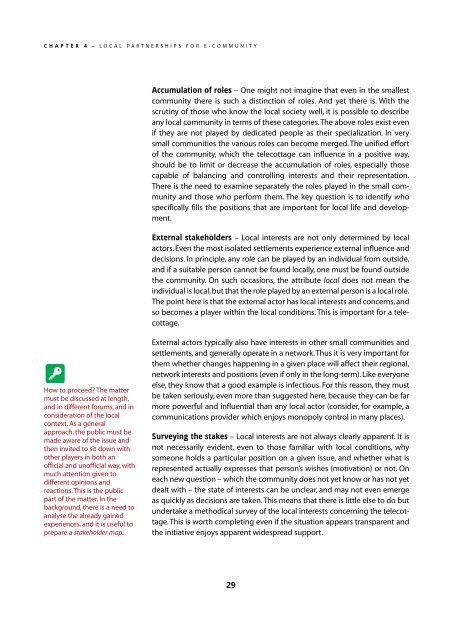Telecottage Handbook- How to Establish and Run a
Telecottage Handbook- How to Establish and Run a
Telecottage Handbook- How to Establish and Run a
Create successful ePaper yourself
Turn your PDF publications into a flip-book with our unique Google optimized e-Paper software.
CHAPTER 4 - LOCAL PARTNERSHIPS FOR E-COMMUNITY<br />
<strong>How</strong> <strong>to</strong> proceed? The matter<br />
must be discussed at length,<br />
<strong>and</strong> in different forums, <strong>and</strong> in<br />
consideration of the local<br />
context. As a general<br />
approach, the public must be<br />
made aware of the issue <strong>and</strong><br />
then invited <strong>to</strong> sit down with<br />
other players in both an<br />
official <strong>and</strong> unofficial way, with<br />
much attention given <strong>to</strong><br />
different opinions <strong>and</strong><br />
reactions. This is the public<br />
part of the matter. In the<br />
background, there is a need <strong>to</strong><br />
analyse the already gained<br />
experiences, <strong>and</strong> it is useful <strong>to</strong><br />
prepare a stakeholder map.<br />
Accumulation of roles – One might not imagine that even in the smallest<br />
community there is such a distinction of roles. And yet there is. With the<br />
scrutiny of those who know the local society well, it is possible <strong>to</strong> describe<br />
any local community in terms of these categories.The above roles exist even<br />
if they are not played by dedicated people as their specialization. In very<br />
small communities the various roles can become merged. The unified effort<br />
of the community, which the telecottage can influence in a positive way,<br />
should be <strong>to</strong> limit or decrease the accumulation of roles, especially those<br />
capable of balancing <strong>and</strong> controlling interests <strong>and</strong> their representation.<br />
There is the need <strong>to</strong> examine separately the roles played in the small community<br />
<strong>and</strong> those who perform them. The key question is <strong>to</strong> identify who<br />
specifically fills the positions that are important for local life <strong>and</strong> development.<br />
External stakeholders – Local interests are not only determined by local<br />
ac<strong>to</strong>rs. Even the most isolated settlements experience external influence <strong>and</strong><br />
decisions. In principle, any role can be played by an individual from outside,<br />
<strong>and</strong> if a suitable person cannot be found locally, one must be found outside<br />
the community. On such occasions, the attribute local does not mean the<br />
individual is local,but that the role played by an external person is a local role.<br />
The point here is that the external ac<strong>to</strong>r has local interests <strong>and</strong> concerns, <strong>and</strong><br />
so becomes a player within the local conditions. This is important for a telecottage.<br />
External ac<strong>to</strong>rs typically also have interests in other small communities <strong>and</strong><br />
settlements, <strong>and</strong> generally operate in a network. Thus it is very important for<br />
them whether changes happening in a given place will affect their regional,<br />
network interests <strong>and</strong> positions (even if only in the long-term). Like everyone<br />
else, they know that a good example is infectious. For this reason, they must<br />
be taken seriously, even more than suggested here, because they can be far<br />
more powerful <strong>and</strong> influential than any local ac<strong>to</strong>r (consider, for example, a<br />
communications provider which enjoys monopoly control in many places).<br />
Surveying the stakes – Local interests are not always clearly apparent. It is<br />
not necessarily evident, even <strong>to</strong> those familiar with local conditions, why<br />
someone holds a particular position on a given issue, <strong>and</strong> whether what is<br />
represented actually expresses that person’s wishes (motivation) or not. On<br />
each new question – which the community does not yet know or has not yet<br />
dealt with – the state of interests can be unclear, <strong>and</strong> may not even emerge<br />
as quickly as decisions are taken. This means that there is little else <strong>to</strong> do but<br />
undertake a methodical survey of the local interests concerning the telecottage.<br />
This is worth completing even if the situation appears transparent <strong>and</strong><br />
the initiative enjoys apparent widespread support.<br />
29


